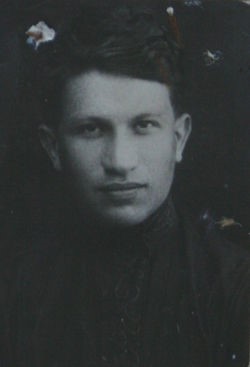Leib Baran was born in 1916 in the town of Drissa (present-day Verkhnedvinsk, Belarus). Upon finishing school, he worked as a bookkeeper at various establishments, first in Drissa, and then in Mogilev, eastern Belorussia. In 1939, Baran entered the Leningrad (present-day St. Petersburg) Polytechnic Institute. In October 1941, four months after the German invasion of the Soviet Union, Baran was drafted into the Red Army and sent to a military school. In February 1942, after a short training course, he was sent to the Leningrad Front as a mortar gunner. In May that year, he was assigned to an officers' course. Upon graduation, in October 1942, Second Lieutenant Leib Baran was attached to the 34th Mechanized Brigade, serving at the Kalinin Front (in western Russia) as the commander of a mortar platoon.
Many of the Jewish Red Army servicemen who had characteristically "Jewish" names changed them (either willingly or under pressure) to "Russian"- or neutral-sounding ones. Unlike them, the serviceman Baran never "Goyified" his name, and all his military documents, including those dealing with his military awards, give his name as "Leib Itsikovich" (a patronymic meaning "son of Itsik") or "Leiba Itskovich", but never as "Lev Ivanovich" or something similar.
Leib Baran was decorated four times. He received the medal "For Courage" after the battles for the town of Velikiie Luki, western Russia, in January 1943, when his platoon had repelled three enemy attacks, and Baran managed to break his platoon out of encirclement. Furthermore, Baran was promoted to the rank of lieutenant and appointed deputy commander of a mortar company. His second award was the Order of the Red Star, in August 1943, for his part in battles in the area of Briansk, west Russia, where he had been wounded. During the crossing of the Oder River by the Red Army in February 1945, Baran was nominated for the title of Hero of the Soviet Union; however, he was awarded only the Order of the Red Banner instead.
Guards Senior Lieutenant Leib Baran was awarded his last decoration, the Order of the Patriotic War, 1st class, posthumously. He was killed in April 1945, near the city of Bautzen, Saxony.







